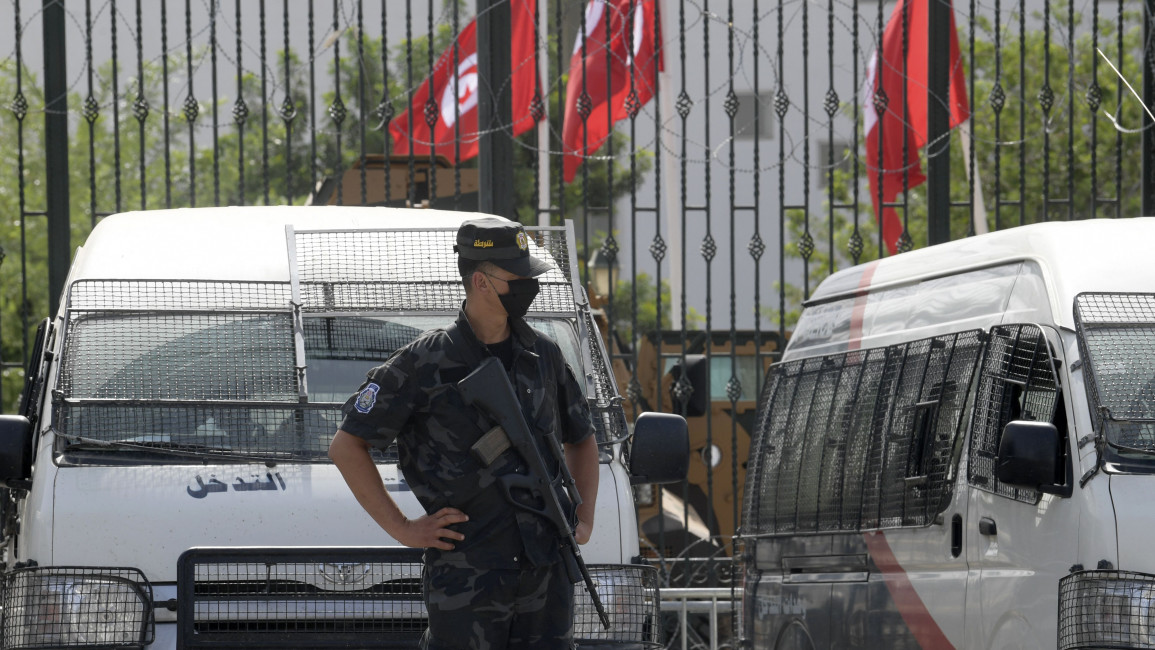Detained Tunisia ex-minister suspected of 'terrorism'
Detained Tunisian ex-justice minister Noureddine Bhiri of the Islamist-inspired Ennahdha party, who is refusing food or medication after his transfer to hospital, is suspected of "terrorism", the interior minister said Monday.
Bhiri, deputy president of Ennahdha - viewed by President Kais Saied as an enemy - was arrested by plainclothes officers Friday and his whereabouts were initially unknown.
Ennahdha had played a central role in Tunisian politics until a power grab by President Kais Saied last year.
Tunisia was the only democracy to emerge from the Arab Spring revolts of a decade ago, but civil society groups and Saied's opponents have expressed fear of a slide back to authoritarianism a decade after the revolution that toppled longtime dictator Zine El Abidine Ben Ali.
"There were fears of acts of terrorism targeting the country's security and we had to act," Interior Minister Taoufik Charfeddine said late Monday of the arrest.
A member of a delegation that visited Bhiri in hospital told AFP on Monday that he was refusing food or medication.
On Sunday activists and a former Ennahdha legislator said Bhiri was in a critical condition and facing death.
But the source told AFP that Bhiri, 63, is "not in critical condition for the time being".
The source, asking not to be named, said that a joint team from Tunisia's independent anti-torture group INPT and the United Nations rights commission visited Bhiri at hospital in the northern town of Bizerte on Sunday.
He is "lively and lucid", and being kept under close observation in a private room of the hospital's cardiology ward.
Since Friday, however, Bhiri has "refused to take any food or medication, prompting his transfer to hospital" two days later, the source said.
Samir Dilou, a lawyer and ex-Ennahdha MP, condemned Bhiri's arrest as "political" and an abuse of the justice system.
He told a Tunis news conference that he is lodging a "kidnapping" charge against Saied and the interior minister Charfeddine.
The interior minister said late Monday that evidence had been sent to the justice ministry regarding Bhiri's activities, but that the prosecution "delayed" action on the matter.
This, Charfeddine said, prompted him to "quickly apply... judicial control" over Bhiri, in a context where he was suspected of "falsifying" identity papers, including for a Syrian woman.
The interior minister said he had "personally verified" that the detainee was being "treated well".
Bhiri's wife, Saida Akremi, also a lawyer, told reporters he had suffered "a heart attack", and that she was being denied access to him because she refused to sign documents as demanded by security services.
Mondher Ounissi, a doctor and member of Ennahdha's executive bureau, said Sunday that Bhiri suffers from several chronic illnesses, including diabetes and hypertension.
He has been "deprived of his medication" and "his life is threatened", Ounissi said, adding that Bhiri usually takes 16 pills a day.
The interior ministry on Friday said that two individuals had been ordered under house arrest, without identifying them.
It said the move was a "preventive measure dictated by the need to preserve national security".
The anti-torture group INPT has identified the second person detained as Fathi Baldi, a former interior ministry official.
The president "bears full responsibility for the life of Mr Bhiri", the anti-Saied group "Citizens against the coup" said Sunday on Twitter.
It said he had been "rushed to the hospital in a very serious condition".
Saied on July 25 sacked the Ennahdha-supported government and suspended parliament, presenting himself as the ultimate interpreter of the constitution.
He later took steps to rule by decree, and in early December vowed to press on with reforms to the political system.



